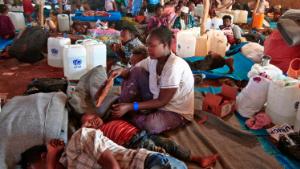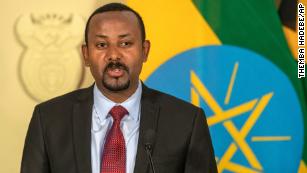These refugees fled a massacre in Ethiopia's Tigray region. They join tens of thousands making the journey to Sudan
Oyeb Bari was woken by the sounds of guns and live ammunition on the night of November 9. The 55-year-old mother of six wasn't immediately sure what was happening, but had heard about the unrest in her region.
It wasn't long before "abusive" men started to bang on doors, and Oyeb realized her family was in danger.
They left their home onto the streets of Mai-Kadra, a market town in the northern Tigray region of Ethiopia. There she said she saw men, women and children being slaughtered by the aggressors with sharp weapons like machetes and knives.
Oyeb fled with four of her children on foot through forest pathways until they reached the Sudanese border, a few miles away. From there, they were transported by car to the Hamdayet refugee transit center, where they will stay until humanitarian organizations relocate them to a camp.
Her husband and two of her children are missing, she told CNN at Hamdayet.
"I thank the Sudanese people for giving us this home, but we are still hungry," she said. "We took nothing with us, we just fled with the clothes we are wearing."
A large number of civilians were killed in the massacre at Mai-Kadra, although CNN has been unable to independently confirm who was responsible for it, or the exact death toll.
The incident came days after Ethiopia's federal government declared "war" with the region's ruling party, the Tigray People's Liberation Front (TPLF), earlier this month. Ethiopian Prime Minister and Nobel laureate Abiy Ahmed ordered the Ethiopian Defense Forces (EDF) to lead a "law enforcement operation" in the area, which includes air strikes.
It is a conflict that threatens to undo years of progress in Africa's second most populous country and the restive Horn of Africa region.
Thousands like Oyeb have made the journey to neighboring Sudan where they have encountered a shortage of food, beds and shelter. The UN has described Tigray as a humanitarian crisis, and one which will only escalate in the coming weeks.
A town 'covered with corpses'
Another survivor, Gashaw Maleda, said four of his friends escaped, but another 15 were killed. Tigrayan militias came with machetes and knives, looking for people from the Amhara region to kill, he said.
"I hated being human at the time. We came here to work, but when they realized that the defense force was winning, they killed us for no reason," he said over the phone to CNN.
Photographs and videos digitally verified and geolocated by Amnesty International, and seen by CNN, show bodies strewn across the streets or being carried away on stretchers the next day. Distressed locals, dressed casually in jeans, T-shirts and sports jerseys, can be seen scarcely able to believe the mounds of bodies covered with blankets in front of them.
One local resident, who spoke on condition of anonymity, saw the town "covered with corpses" when he arrived at 4 p.m. local time on November 10. Put in contact with CNN through Amnesty International, he was horrified by the number of bodies on the street, mutilated by machetes and knives in what seemed an indiscriminate massacre.
"They have no reason to commit this murder," he said. "It is a cruel act that should be condemned by everyone. I have never seen anything like this in my country of birth."
The TPLF have not responded to CNN for comment but have publicly accused federal forces of killing innocent civilians while targeting churches and homes. The government has denied targeting civilians.
Victims told the man, who delivers food for the EDF, that they were mostly day laborers and accused armed forces of surrounding their homes and attacking them, corroborating what other survivors described.
Why are there fears of civil war in Ethiopia?
After conducting an independent investigation, Amnesty said that scores -- and likely hundreds -- of people were stabbed or hacked to death in Mai-Kadra.
"This is a horrific tragedy whose true extent only time will tell as communication in Tigray remains shut down," said the regional director for the human rights organization, Deprose Muchena, in a statement at the time.
Hospitals overwhelmed
A clean-up operation began as bodies were buried and the injured were rushed to hospital.
"When we arrived, we found that many people had been killed or injured," another local resident, whom Amnesty International connected to CNN, said over the phone. "Then we worked together to pick up the dead and take the wounded to the hospital."
Speaking under the condition of anonymity, he said families buried their own dead and the government buried those who were unclaimed. The witness, who came into Mai-Kadra as an EDF volunteer, estimated that 150-200 people were attacked but added that quantifying exact numbers was difficult in such a large place.
The volunteer said it will be difficult to regain his "sanity," after seeing something so gruesome for the first time. The struggle between the federal government and the TPLF is not over yet, he warned.
"In Ethiopia, I have never seen anything so bad at my age. It will take a lot of work to make the local community more resilient in the future, as well as to prevent the families of the deceased from taking revenge," he said.
A medical doctor in the Mai-Kadra area said under condition of anonymity that the attack was carried out with sharp objects, like machetes and knives. He said the victims must have tried to defend themselves at one point, because some were killed by guns.
Patients were treated at his hospital within 24 hours, with those who were severely injured referred to more suitable institutions. There was no electricity, internet or running water in the town and the only activity was that of defense forces and aid workers.
"When I arrived in Mai-Kadra town, corpses were seen on the streets," he said. "We went into some houses and found that there was no water or electricity, not even for us. It was impossible for anyone to work and eat around the area."
He said it was impossible to quantify the deaths, and it remains to be seen who carried out the attack.
Tigray civilians paying the price
As Ethiopian troops close in on Tigray's capital of Mekelle, leaders of the TPLF refuse to surrender. In a statement posted by the TPLF on Facebook Wednesday, Tigrayan leaders vowed that "the people of Tigray will never kneel down to actions of aggressors," as Abiy said the deadline for them to surrender had expired.
The Tigrayan leaders accused federal forces of killing innocent civilians while targeting churches and homes. The government has denied targeting civilians and CNN has been unable to verify claims from either parties due to the communications blackout. Internet, mobile phones and landlines are all down.
While the warring factions sling accusations at each other, hundreds of civilians are dying across the region as violence continues.
Halka Alm, a 42-year-old father of three, arrived in Hamdayet, Sudan from a village in Ethiopia which he told CNN was attacked by "abusive soldiers" with guns, knives and machetes during the night. He also fled on foot to the border and some of his children and other relatives got lost along the way.
He accused Abiy's army of targeting ethnic Tigrayans and his home was looted. Redwan Hussein, the government spokesperson for the State of Emergency task force, told CNN on Wednesday that no civilians had been killed by the federal forces that they knew of.
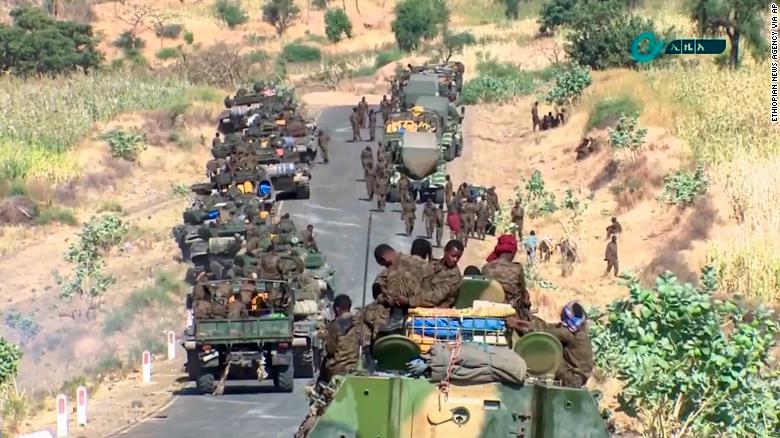
This image, made from undated handout video released by the state-owned Ethiopian News Agency on November 16, 2020, shows Ethiopian military gathered on a road in an area near the border of the Tigray and Amhara regions of Ethiopia.
"We lost everything," Halka said. "Yesterday we went to a nearby lake to wash what we were wearing."
There have been reports of atrocities since Abiy ordered air strikes and a ground offensive against Tigray's rulers for defying his authority.
The situation risks spiralling "totally out of control"and war crimes may have been committed, the United Nations said on November 13, as repercussions spread around the volatile Horn of Africa.
The US State Department's top diplomat for Africa and the US Ambassador to Ethiopia told reporters on a call Thursday that the chance of a mediated settlement in the growing Ethiopian conflict seems slim at the moment.
"Neither the Ethiopian government nor the Tigray People's Liberation Front (TPLF) are interested in mediation at this point," said Tibor Nagy, the US assistant secretary of state for African affairs.
A refugee crisis
Hundreds have died and at least 30,000 refugees have fled to neigboring Sudan, according to the UN.
Most of them are entering through the Hamdayet and Lugdi border crossings, according to the UNHCR. They are taken to transit centres such as the one at Hamdayet and held there until they are registered and relocated to refugee camps scattered across the Kassala and Gedaref states in Sudan.
Hamdayet is a small transit center with a capacity for 300 people but already nearly 20,000 have arrived, according to the UN. To mitigate the risk of coronavirus spreading among the population, social distancing has been introduced in registration areas, ensuring a two-meter space between refugees.
Refugees arriving at Lugdi are transported by the Sudanese government to a site called Village 8. With only 1,200 housing units available, the population has passed 10,000 people as of November 18, according to the UN. Due to logistical problems and congestion in Lugdi, refugees have yet to be transferred from Village 8 to a refugee settlement site.
Village 8 is only accessible by crossing a river, using one small ferry. This has resulted in long waiting times.
Humanitarian organizations are struggling to provide services amid the tsunami of refugees, said the World Food Programme (WFP), the food assistance branch of the UN.
"We have enough food for 60,000 people for one month," the country director of the WFP, Hameed Nuru, said on Wednesday. "The situation in the camps at the moment is a bit chaotic. People have arrived with little or nothing and are camping out in the open, making makeshift shelters out of cloth and wood, or staying in temporary communal shelters."
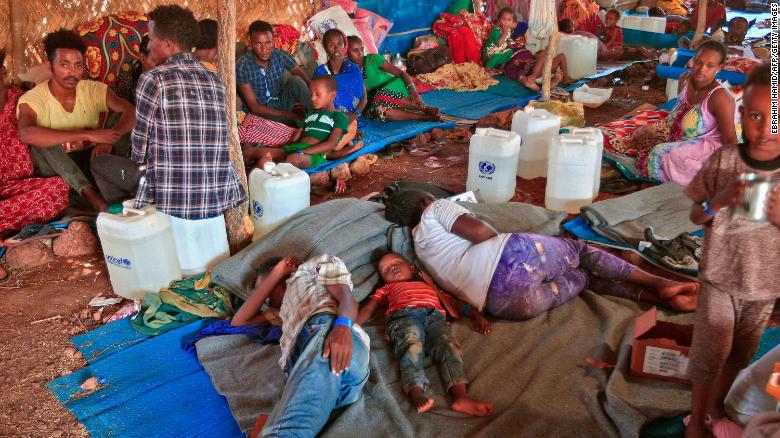
Ethiopian refugees who fled fighting in Tigray province lie in a hut at the Um Rakuba camp in Sudan's eastern Gedaref province, on November 18, 2020.
Maras Balai, a 53-year-old mother of five who also fled Mai-Kadra, said she spent two days on the road to the border.
"We had to hide ourselves during daytime and move by night to avoid being targeted," she said. "We took nothing with us, no clothes, no mattresses, no food. We are still hungry, it is good that we have shelter in this camp but there is no food."
The UNHCR is taking the lead on the humanitarian response and aid agencies are scaling up to provide blankets, jerry cans and emergency shelters. The WFP is providing hot meals to refugees arriving at the reception centers, but said it is challenging to prepare food with a lack of cooking utensils and facilities.
There were already thousands of refugees living in the Sudanese camps before this crisis. The security situation is hampering the delivery of lifesaving services to some 96,000 Eritrean refugees, as well as to 100,000 internally displaced peoples that were already in Tigray, the UN added.
Its refugee agency has called for a "temporary ceasefire with immediate effect to allow humanitarian corridors to be established" so that additional rations can be distributed to these refugees
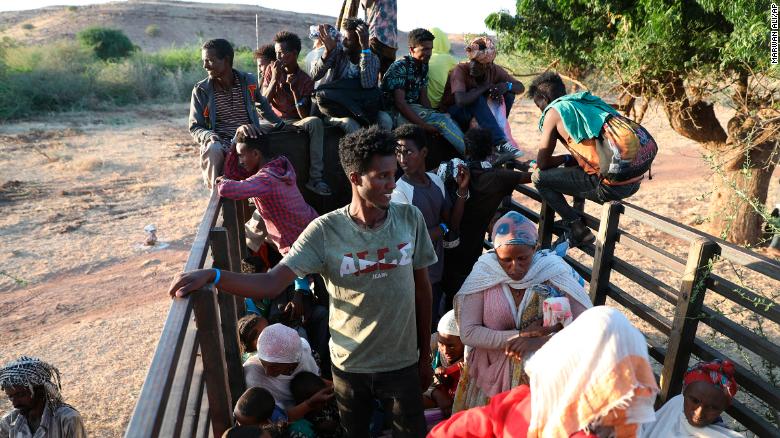
At least 30,000 refugees have fled to neigboring Sudan, according to the UN.
Where cooking facilities are unavailable, the Sudanese Red Crescent Society is distributing high-energy biscuits. It is also working alongside Sudan's health ministry to provide hygiene kits, medicine and water purification tablets.
The humanitarian organization called for psychosocial support for those who left their loved ones and belongings behind. It also said the influx of refugees adds additional burden to Sudan, a country that was already facing a humanitarian crisis due to recent floods, locust infestations and the coronavirus pandemic.
"The situation has been and still is generally unstable in this region with the troubles and influx of refugees, especially from Eritrea and Ethiopia," Rashid Aldaw, a senior officer for the Kassala state refugee commission, said at Hamdayet. "The situation in this camp is disastrous and necessitates immediate intervention."
The area is difficult to access and the UN Humanitarian Air Service, managed by the WFP, is operating daily flights to Kassala and can deploy helicopters to reach isolated groups.
Abiy promised to "reintegrate our fellow Ethiopians fleeing to neighboring countries" in a tweet on Monday night. The UN is negotiating with Abiy's government to provide access to affected populations. Regional bodies such as the African Union are doing the same in Addis Ababa, said the UNHCR.
The International Committee of the Red Cross (ICRC) said more than 1,000 people have contacted its hotline and visited its offices in Mekelle and Addis Ababa seeking help for their families. The humanitarian organization, based in Geneva, has provided hospital beds, mattresses, mats and blankets to health facilities.
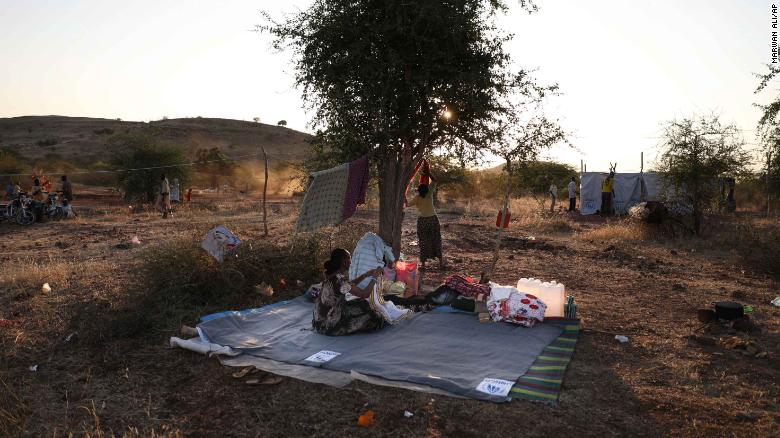
Ethiopian refugees gather in the Gedaref region in eastern Sudan on November 18, 2020.
The European Commission is mobilizing an initial €4 million ($4.75 million) in emergency assistance to help support those arriving in Sudan. It will support NGOs and the UN in Kassala and Gadaref.
"There is a real humanitarian crisis being created by the unfolding conflict in Ethiopia's Tigray region," said the EU crisis management commissioner, Janez Lenarčič, in a statement on Thursday. "Civilians are paying the price for this conflict."
The UN expects 200,000 refugees to arrive in the next six months, and a humanitarian crisis of disastrous proportions is unfolding. As the Ethiopian government continues to battle it out with the TPLF in Tigray, the true cost of the fighting is only just beginning to surface.
Yidnek Lema and CNN's Bethlehem Feleke, David McKenzie and Brent Swails contributed to this report.

